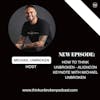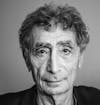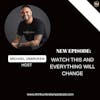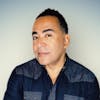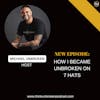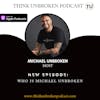Self-Empowerment and Trauma Healing with Dr. Stephanie Carinia
Join Dr. Stephanie Carinia as she guides listeners on their journey towards self-empowerment and healing from trauma. In this powerful podcast series, Dr. Carinia shares her expert insights and personal experiences to help individuals overcome obstacles...
See show notes at: https://www.thinkunbrokenpodcast.com/dr-stephanie-carinia-the-road-to-self-empowerment-trauma-healing-podcast/#show-notes
Join Dr. Stephanie Carinia as she guides listeners on their journey towards self-empowerment and healing from trauma. In this powerful podcast series, Dr. Carinia shares her expert insights and personal experiences to help individuals overcome obstacles and reclaim their power. Discover practical tools and strategies for managing trauma and building resilience, as well as inspiring stories of hope and healing. Tune in to the Think Unbroken Podcast and start your own road to self-empowerment today!
************* LINKS & RESOURCES *************
Learn how to heal and overcome childhood trauma, narcissistic abuse, ptsd, cptsd, higher ACE scores, anxiety, depression, and mental health issues and illness. Learn tools that therapists, trauma coaches, mindset leaders, neuroscientists, and researchers use to help people heal and recover from mental health problems. Discover real and practical advice and guidance for how to understand and overcome childhood trauma, abuse, and narc abuse mental trauma. Heal your body and mind, stop limiting beliefs, end self-sabotage, and become the HERO of your own story.
Join our FREE COMMUNITY as a member of the Unbroken Nation: https://www.thinkunbrokenacademy.com/share/AEGok414shubQSzq?utm_source=manual
Join us for our FREE trauma Transformation conference this December at: https://unbrokencon.com/
Download the first three chapters of the Award-Winning Book Think Unbroken: Understanding and Overcoming Childhood Trauma: https://book.thinkunbroken.com/
Join the Think Unbroken Trauma Transformation Course: https://coaching.thinkunbroken.com/
@Michael Unbroken: https://www.instagram.com/michaelunbroken/
Follow us on TikTok: https://www.tiktok.com/@michaelunbroken
Learn more at https://www.thinkunbrokenpodcast.com
Learn more about Stephanie Carinia at: https://www.psychologiststephanie.com/
Support the Podcast: Become a listed sponsor!
Follow me on Instagram @MichaelUnbroken
Learn more about coaching at https://coaching.thinkunbroken.com
Get your FREE copy of my #1 Best-Selling Book Think Unbroken: https://book.thinkunbroken.com/
Michael: Hey, what's up Unbroken Nation, hope that you're doing well. Wherever you are in the world on Michael Anthony — author speaker podcaster and advocate for adult survivors of childhood trauma and you're listening to the Michael and Unbroken podcast. Today, I'm super excited to welcome Clinical Psychologist, Stephanie, Carinia, Stephanie my friend. How are you today?
Stephanie: Thank you for having me, Michael. I'm very good and I'm excited to be in your show or your podcast.
Michael: Yeah, I'm super excited to have you here. Here, you know I love what you're doing on social media. I love the conversations that you're having. I love that you're stepping into this thing about healing and personal growth in the journey that I think so many of us need to go on even though a lot of us don't, and before I jump into that and start down that path with you what kind of LED you to this place? How did you end up doing what you're now doing?
Stephanie: You mean also reaching out to people on a broader level? Not only my work as a psychologist.
Michael: Yeah. Exactly, And all of it. Right?
Stephanie: Yeah, yeah. So often, you hear that people become a psychologist, or people think that people become a psychologist because they want to help other people. In my case, it was that I was fascinated by human behavior. Why do we behave the way we behave? Especially the unconscious. I'm focused on personality and Trauma, which is often the cause of personality problems. So I was working just in mental health care institutions.
And still went by the way, but I got frustrated by clients who said that their interventions were life-changing, and why didn't I know these ten years before? And I was frustrated by the fact that there's a lot of information that should be possible and accessible to everyone out there, and people should not have to become in this case when I was working in an addiction center, someone told me, do I have to develop a cocaine addiction to be able to have access to this information life-changing information. And I agree with him, why should not some basic information be accessible to everyone and that's what motivated me to start my Instagram account psychologist Stephanie a while ago. I'm very happy now to spread my message on a wider level, just like now.
Michael: Yeah. And that's beautiful, and it's powerful, and I am in complete agreement. I think that if anything, if we're going to make the world a better place, we have to make access to information stronger and you know, one of the things that's really beautiful is we can have conversations on social media and Instagram and an email and via text and it's not hidden and kept from people, and now I think more than ever we have Mission to seek it on our own. What if anything, like as you are in this and you're noticing the impact that you're having on social media? What, if anything, do you feel like is the thing that people are most seeking when they're reaching out to you, and they want to step into what's next in their life?
Stephanie: What I hear most often what resonates people letting me know that my post resonates a lot or the install lives and they said that for the first time or place they feel understood, they're like wow these messages are directed directly to me I never knew I always hear this often I always knew there was something wrong, but I couldn't pinpoint it. And what I guess what people really a lot of people out there really missed want that set is that sense of connection of feeling understood? Because we're not, we're all not crazy; we are all sensing something inside. But if childhood trauma hasn't been identified correctly, our parents and we're emotionally neglected. We won't be able to pinpoint what it is, and we won't trust our own judgment. We definitely have our own judgments, and I think that people with social media now can at least identify what they already know inside but haven't yet consciously understood.
Michael: Yeah, that's such a great way to put it, and I'm a proponent of that I believe in that entirely. And I know the only way that we're going to create viable long-term change is by having communal intervention. We're going to have to come together as a species of human beings to walk the line and tow the boulder of working through this. So many people just want to be seen, felt heard, and that thing which you mention is in part of them, they kind of know. Something has happened to them; they kind of feel it. What's it like for you in the role that you are when someone is finding that, how do we help guide them? Or even, I guess, the better question is, if you are a person who has felt, hmm, something's off something doesn't feel right? I know something happened. How do you start this process to be curious about in to investigate it?
Stephanie: That's a good question. We need to inform ourselves. We need to get the information, so I think it's very healthy that everyone is seeking out there on social media. If they don't have access to a therapist or whatever, they just start getting the information you need to know to understand yourself more. Yeah, I wouldn't know. I'm not sure. Do you have any ideas? I'm curious about your thoughts on this.
Michael: Yeah. Well, you know, “I think a lot of it is just about giving yourself the grace to be curious enough to step into it, right?” We live in Western Societies in many societies around the world where we should feel shame, or guilt, or worse about things that have happened to us that are not our responsibility. And I'm always thinking about how we can help give people access to more tools to step into that place where they're willing to say, yeah, I need help. Right? And and and that's so much of the conversation. How do we effectively navigate people into knowing that it's okay to ask for help?
Stephanie: Hmm, and this reminds me of I was listening to a podcast of yours and which you were in a source of post on it on that this there's this whole taboo of blaming our parents right or talking about that discussing that even questioning our Childhood, if our needs were met, etc. and I think that, that is the first step to break this taboo and curiosity is everything. “I remember once listening to a podcast, and there was a question that person said, what are the two most important things that can make you happy ASAP? And one of them was curiosity. So if we're able to stop judging but change, transform that judgment into curiosity, we're going from defense mechanism to growth. Curiosity is key.” And as for being curious, a lot of especially childhood trauma is created in Childhood. It's not for nothing, and also with a personality the, in the way we interact, right now, Michael the projections we will have towards each other, everything everything is guided by, we are shaped in Childhood. And so we need to go there, and a lot of people are scared, there's even one person who has created their account to be able to follow me because she's so afraid what other people will think because I'm posting on Childhood our parents. And I think that it's important for people to realize that when we go to our Childhood, our purpose is not to blame who cares about blaming, we want to heal with blaming we're not gonna heal, okay?
So going to our Childhood and questioning and re-evaluating how we have, what has happened Is with one purpose, only to acknowledge the needs that were met and what was done to us. We're not talking about if they did it on purpose or not; our psychology doesn't care about that. That's not the point. But when we're not going to recognize and acknowledge what was done to us, we're going to misinterpret it. And we will have our inner critic haunting us for the rest of our lives. And we won't be able to develop self-compassion, which is crucial and will be, we will be trapped in, and it will affect our relationships, we won't be able to trust people. So actually if you would look at it from that perspective, it is quite selfish to not go to Childhood, it is not, it's quite selfish if we wouldn't blame put the blame on the one that caused the damage that also goes in our daily lives because when we don't, we will blame ourselves, depression, for instance, is internalized anger, and we won't be better persons in society if we project our anger towards other people or towards ourselves, right?
Michael: Yeah, absolutely. And you're going to upset people and saying that because we often and especially in American society, we put our parents in the adults around us in our youth, on a pedestal, they can do no wrong. They're doing the best that they can, and yes, to the extent that is likely true, people are only doing what they've been taught through learned behavior and experience to do. However, I also believe that there is a space for the responsibility to be taken. And that should not be the burden to carry as a victim to be a child who was hurt, abused, beaten, starved sexually, molested, whatever that thing was and, then turned into an adult having those same experiences at carrying with you. There is a moment in which you have to understand that it's actually not your fault and remove the blame you give yourself because you carry that burden with you? And I think that is often the boundary between step being into something that can be powerful in a healing journey and being stuck in that place where you feel like the world is against you, and that's such a battle. How do you begin to transform your own understanding of fault and blame and responsibility when you have been hurt in Childhood?
Stephanie: Hmm, I think so, we hear this often, what you're saying, we need to not carry it with us anymore and what you often hear is you know, this society is social media, which is very concerning is telling us to heal because everyone wants to heal the whole trend and also a healthy trend, of course, so a degree, you need to forgive as well. And that will with that we bypassed healing. That is very concerning because when we forgive to sue without the acknowledgment of what was done to us. First of all, you cannot really forgive, because to forgive, we need to have self-passion, self-compassion we can only have when we acknowledge, it's not necessarily our parents who have to acknowledge it as long as we or I don't know with the therapist acknowledges what happened to you. Only then we can have self-compassion, and then we can forgive, but we need to go to those situations that the childhood and that is complicated that's why I also created a heel, you're in a child online course, for people to understand and give specific examples of what can go wrong. And you're mentioning now a couple of things if you were sexually abused or you were beaten etc. So these, at least I'm not saying that it makes it easier but at least were visible things that happened as a child at least but I have a lot of clients high functioning with amazing parents who are still together, and they haven't had a connection in their whole life. They're living in prison because they were manipulated by narcissistic dynamics etc., for instance, and that is much more complex. So, people, it would be amazing if it's social media, we could go more specifically to childhood situations, and people could start identifying situations.
For instance, I have a client, I used to have a client, and he said, my childhood was great, everything was great. And then we go deeper, turns out that the parent was very selfish. And so now he doesn't trust people. We need to acknowledge all these things. Because often a, for instance, another example, Mike, I'm not sure if you've heard it, heard this one, I hear this often with people around me. My mother is just difficult. She means, well, she's just anxious being anxious, okay? She was just overprotective. Well, I disagree with that. She might have been anxious, but apparently, she's selfish not to take her problems to a psychologist and to burden you with worrying about her, and you should be a child, you should be worrying about yourself, you should not be wearing it about your parents, and that is traumatic. If you need to comfort your parents, that is not okay. It's robbing your childhood, etc. It has a lot of implications for people who are not aware of that. This is just an example.
Michael: Yeah, yeah. So true and a lot of that can be covert. You just don't see it, but it doesn't mean it's not there. As people are starting to recognize this and more so in more, so because now we're having conversations with words like narcissism words we hadn't used before and looked at that in stepping into it now understanding, we and order to continue to step into this path of healing, need to create boundaries and understanding around our once needs interest in value so on and so forth. What I'm curious about from your perspective, as what role does having boundaries in your life play in the Healing Journey?
Stephanie: So yeah, I came up with this, this healing steps. So you have step one of acknowledging. I'm wounded in the first place because a lot of people are in denial. I'm wounded. I'm surviving than thriving, and the other one is connecting to your emotions. The other one is creating your emotional home, your safe haven. The fourth one is the healing, the wound acknowledging what was done to us to be able to get the self-compassion and create self-worth. The fifth one is the relationships you need to repair.
So the emotional home is about what we need; you suppose that you're living in a house with a roof over your head, assuming most people do, there is a reason you want protection. You want someone to be to retreat to be able to restore your energy, to reflect, you know, to be safe literally. So a lot of people with trauma don't have any motion or home. We forget that that that we need one and "emotional home is your own Safe Haven, that's the space you the place you go to an emotional place in this case where you feel safe." But with especially with trauma, when you have this inner critic because you're yet not have acknowledged what was done to you so all the blame goes towards ourselves we beating ourselves up as inner critic and the shame that can be killing a lot of people out there with who experience shame. No, know how hectic that emotion is, and we need to hear I think it was a beautiful sentence in Pete Walker's book, as well, from surviving to thriving, we need to take our own side, and that's so we need to protect our, we need to have our home, and your question was about boundaries, well, the door in a home is a boundary, right? If there are bad people, I assume you close the door. You're not opening the doors, is that correct?
Michael: Yeah, of course.
Stephanie: But a lot of people, if they have a home, they don't have doors, and everything comes in, and it's unsafe, and that is boundaries, we need to have a home and have doors and close them.
Michael: Yeah, I love that analogy. That's really beautiful. So what does it look like to start to build that? Because, you know, our agency is taken from us in abuse and in trauma and as a ramification of the things that happened to us. The idea of standing up for ourselves is terrifying on its own, right? There's typically ramifications or judgment or shame or whatever that comes with that, and to now being an adult and to have a conversation with yourself that says, I need to stand up for myself, is incredibly uncomfortable because everything you've understood to this point was that it's not okay. How do we make ending up for yourself okay?
Stephanie: Yeah, that's a good point. So what you're describing, Michael, is, in this case, is that people will still be burned with the projections of the unsafe parents. So they will because normally in life people just like you said, I loved it. What did you say like people are not out to get you, right? We went traumatized. We, of course, will think that people are out to get us because, as a child, they didn't care about our needs and there were hurting us. So, of course, we developed a worldview that people are unsafe. That makes sense. But now we're on adults, and assuming that you're in a safe in, you've not held hostage or whatever, and you're sort of in a safe environment, you need to understand that people can be safe too. So they have, they appreciate you healthy people appreciate setting boundaries, right? I mean, so I'm posting, I'm having this, these first and doing it on purpose, by saying that like and you read it on social media as well, that taking care of yourself is a priority, and I'm taking it a little bit further. Not expressing anger is by not expressing anger; we abandoned, we're abandoning not only ourselves. We are abandoning the other person because we're withholding something from them. So not expressing anger is selfish because that other person doesn't have the opportunity to meet your needs.
Michael: Yeah. I mean, it's, I mean, realistically, the hard part about it is that it is, it's a learned process that requires an immense amount of patience, that also requires help and guidance. And, and I think about this idea that if you can't feel one emotion, then it's very unlikely you can feel any of the range of emotions, and like, anger is not necessarily a bad thing. I constantly think about anger as fuel for what I do, so much about thinking I'm broken because I have this little chip on my shoulder over here. That says, watch what I can do even though you did those things to me. And for me, I've been able to step into this place where the fear of judgment no longer exists in my life because I've created personal sovereignty.
I have an understanding of who I am, of my boundaries, my once needs interest, and the whole gang out of everything that makes me. But at the beginning, it was hard beginning; it was so incredibly difficult to put myself in a position to be willing to acknowledge emotional capacity. And at one point, I actually thought I might be a sociopath. I haven't cried in 15 years because what had happened is I had become dissociated and shut off. One of the things that I think is really pointed in this healing journey is to remove yourself from being disassociated or dissociated, excuse me and start to step into the awareness of who you are. How much of that is a role in the healing of just being willing to step into discovering Who You Are.
Stephanie: And I'm curious with Michael if I can ask, so how did you do that? So, at some point, you decided I'm gonna step up and express myself. I'm not going to hold back and be dissociative anymore.
Michael: Yeah. Well, of course, I didn't have the words for it then. Writing the word association did not exist in my vocabulary, but it was more of an understanding that I'm not living up to my expectations. And that's really what it was, and as I stepped into the journey, and it would be in therapy or men's group therapy with my coach or reading a book or at a seminar, I would start to discover things about me that I was interested about. Then I just started moving towards them. And then one day, I just woke up, and I was like, oh, I feel like I'm starting to be that person I always thought I could be right. I noticed the emotional capacity to had. I noticed my physical body like sensation and emotion. I noticed just being present, and that so much was just in the process of the healing journey. And so that's why I was curious about it is that something that is an across-the-board thing, how much of this healing is just becoming who you are capable of being?
Stephanie: Yeah, the point I think, so childhood trauma is nothing else than because a lot of people say, okay. So think perhaps say, okay, so you have a bad childhood. Okay, so it wasn't much fun. Okay. It's not about that. It wasn't much fun; it's not about the pain that we suffered as a child. It is about a 2, it is about the consequences of what happened, and that is that they will be arrested development as it is called. So a lot of functions we have our off are switched off, and that is very unfair if you would say if you and a lot of in it's not visible at least if you have trauma, physical traumas, visible. Still, child people with childhood have a lot of functions that don't work, and to navigate through life without that is so much harder. It's so much harder to navigate through life without being in touch with anger or feeling that you're not allowed to be anger is very hard. This is not the best analogy that I have. But for now, it's the best I can come up with is if you're driving a car, I assume that you're driving a car with, you know, the different, the different gear, right? Gear 1 2, 3, 4 5, right? Is that correct?
Michael: Yeah.
Stephanie: Yeah, I don't know the English term, but they get big air. So you need to understand that with childhood trauma with this Arrested Development, you're driving of the car with only like one and five. You don't it is, it's not much fun. And what you want to is to have full access to the whole car to be Joy, drive, and anger, people don't understand the power of emotions; anger is our power. So anger, if it's not a process correct. If anger process correctly, it is our power. It will get us what to where we want. Anger is not only protection from harm, and anger is the power to get our goals done to keep our focus to fight for what we want. When we are in touch with our anger, we are much safer people than other people. For instance, the price of being a nice, interesting article. This one is fascinating. I never thought about this. Did you know that people who are nice are judged as less trustworthy?
Michael: I didn't know, but I believe it.
Stephanie: Yeah. And the reason is, because if you're nice as you never express your anger or dissatisfaction in an interaction with someone. You're not, you're hiding because we're all angry, perhaps it's been suppressed a year, very proud of you have a phone response, you're very proud of all I'm never angry, but that's, that's emotional neglect. If you're not in touch with your anger, that's a result that's a trauma response, and if you're proud of it, that's a bigger trauma response that means as a child, your anger was eliminated by rejecting you or shaming you for it and then you're going through life with only one or two gears, instead of five.
Michael: Yeah, I mean, that makes perfect sense to me and, you know, I think so much of my experience and many of even, my clients are anger, was, not allowed. You are not allowed to be angry. You are not allowed to express that side of yourself, and I noticed, and I had it actually pointed out from one of the men in my men's group therapy many years ago. He said, you don't know how to be angry, and that was fascinating to me because no one had ever said that to me because I didn't recognize that I had been disallowed that emotional response in my childhood because every time I'd get upset, there would be ramifications. And what I discovered by tapping into that emotion, Stephanie and I’m in complete agreement with you. It became fuel, right? It became the thing that drives me in a healthy way, not in a self-destructive manner. So let's be clear, there are two ways that anger exists, probably more. As I stepped into that emotional capacity, the other side of it was I also started to realize the other emotional capacities that I had. And think the challenge we face most often is the hurdle of being able to step over. It's not okay to be angry into it is okay to be angry. How do you get to the place of it is okay to be angry?
Stephanie: I would put it a little bit differently, I would say it is not okay not to be angry. It is selfish not to be angry; the damage you're causing to society by not be angry is huge, and don't get me, and let's get this straight. If you are not expressing your anger, those types are proud of it, depending on the temperament type. It's going to get out there in a passive-aggressive way, and that won't make people happy. I had that myself as well; I can when the pressure goes up, I'm going to be passive-aggressive, and that it's not much fun to people, so I need to work hard to get my anger out at that moment or if it's not going to get go underground. In a toxic way, passive-aggressiveness and with password aggressiveness, I mean that you're gonna sort of sabotage things but in a very invisible way, and otherwise it can cause depression. So it is bad for society when we're not angry, and we need to understand this.
The reason that we are afraid to be angry is that in childhood when everything is learned, our worldview develops, our world map representations are called in Psychology is because as a child when we express anger which is very healthy as a child instead of being validated like, honey, I hear you, I see you're very angry right now. It's not okay to talk to Mama that way, but I do see that you're angry, and I would like to talk to you because I want to know what's up. If so, that's a healthy way of responding to anger; if that was done correctly as a child, then we learn that, uh, it's okay to be angry. I need to, of course, do it. And I cannot start hitting someone, but I can express it. They try to help you with words, and you get the impression that people and adults hoods are appreciative if you show your anger which is your communication to healthy boundaries to stay connected. Still, when that happens, when we have wounded parents, I call it wounded, traumatized parents, or wounded parents. They are going to be afraid of anger. They cannot view it for what it is an attempt to connect an attempt for someone to show the boundary, or the power or the goal. It's actually an anger connecting; it's a not showing anger posted on this, not showing you're by not showing your anger, you're disconnecting without the person knowing, so you're not letting the other person know that you're checking out within perhaps you're talking. You're nice, but you are, we are right all know, you have already checked out emotionally if that makes sense.
Michael: Yeah, I love that, and I love the correlation that you made between anger and using it effectively and being a boundary because it's so true. I mean, we as human beings, the one thing that we have is our emotional capacity; they often say that's what separates us from animals, right? And to deny yourself is to deny the very thing that makes you a human being, and it's scary, and it's uncomfortable, and it's hard. “But the only way that we grow is through being uncomfortable and doing scary and hard things. Because if we don't, then we cannot create new data points. We cannot make new meanings. We cannot Figure out how to access situations.” And I do think there is a healthy way to step into anger that is productive and not counterproductive. I love this conversation; it's really powerful because I think what might be happening right now is we're just giving people permission to be able to feel anger. Like, that's a part of this Mission this goal of healing, is fill it all, fill it all because it's there. It's deserving of you to be able to be a human being one of the last questions I have for you before I let you go for the evening as if someone is starting this journey and they hear this, and they're like, you know, Stephanie that sounds great. But I don't know what to do. I don't know to Ruby again. What advice do you have for someone listening who just feels like they have no idea where to start this process?
Stephanie: Because of the question, I think it just starts reading on it. There's a lot of inner child, hitting books, read your book. I think I really appreciate your work in a why Michael because you there's a lot of you know, psychologists writing books Etc. which is amazing but you have your own expenses survival experience, you are able to guide people, the best, you are able, you've done it yourself now you have this recovery path. So I would say follow people. Like you read books. Sorry, the online inner healing Force that I created. There's a lot of information on healing your inner child, I guess. Just start digging into it. I mean, how did you do it, Michael, if I am my own ask?
Michael: Um, the number one thing for me in the beginning was I acknowledged that I needed to do something and in that acknowledgment, what happened is I let go of the understanding that it was my fault and I didn't have the words for that 10-12 years ago, I just knew that if I didn't take control over my life, nothing was going to change. And then, just like you said, it was about education. If I think about anything, the most potent substance to creating change is education. And in that I read all the books, I mean I got Pete Walker over here, I got Brendon Burchard here, I got ever, I mean even you know, Bessel's over here too on my bookshelf and just consuming knowledge consuming information, So I could make meaning because the thing that I didn't understand was that I didn't understand. And if you can start understanding the brain, the body takes a Course, take a seminar to go to, you know, a personal development conference, you know, often and even coming up next week, I will be in this room full of people seeking continuing education credit for PhDs because I need to know, I need to learn, I need to grow and so education over everything from me. And so as we start to wrap up here, where can I everybody find you and more? Particularly how can they follow you on Instagram?
Stephanie: Yeah, so psychologist Stephanie on Instagram and Facebook as well. And I'm starting a challenge again; the previous time was to heal your inner child challenge, which I made an online course now from, and now I'm starting self-empowerment challenge, which is for the adults. It's based on the book, adult children of emotionally immature parents. So that's a very talking about covert trauma, and that is that you will also learn how to set boundaries. And to Out there. So follow me on Instagram, I would say or Facebook.
Michael: Beautiful. Thank you so much for being here and being part of this Stephanie, my last question for you is, what does it mean to you to be unbroken?
Stephanie: To be unbroken, yes to be able to take our own side even if we screw up.
Michael: Beautiful, poignant, and simple. Thank you so much, Unbroken Nation! Thank you for listening.
Please also check out the podcast.
Like, follow, subscribe, leave a review, tell with a friend.
And until next time.
My friend, Be Unbroken.
I'll see you.
-Michael
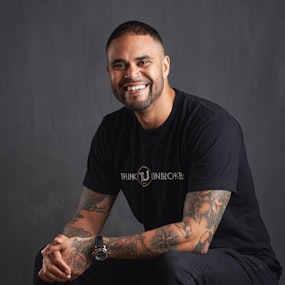
Michael Unbroken
Coach
Michael is an entrepreneur, best-selling author, speaker, coach, and advocate for adult survivors of childhood trauma.
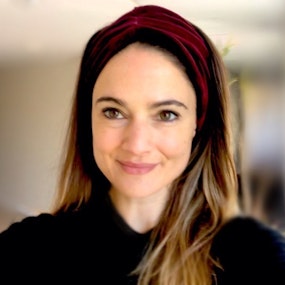
Stephanie Carinia
Clinical psychologist Trauma & Personality Specialist
Stephanie Carinia is clinical psychology & post- graduate degree in Clinical psychology at the University of Amsterdam, the Netherlands.
I'm a registered CBT, EMDR & MBT therapist, also trained in Schema focused therapy and working psychodynamically.
I'm specialised in personality disorders, trauma and addiction. Deconstructing why we behave the way we do & (re)connecting you to your intuition, empowering you, is what makes my clock tick. That’s why I studied psychology in the first place: Why do we behave the way we behave (took the scenic route though, started off studying Law..).
In our daily lives we interact all the time with each other. It is in this interaction that we will encounter our personality functioning. In our interactions we will get triggered. From the working environment, onto friendships which already becomes a more intimate area in life, up to the top of the pyramid.. romantic relationships where we will be triggered to the max as this requires maximum intimacy. The more emotions are involved, the more likely defence mechanisms will be triggered and the more likely problems will arise as a result.
I love explaining psychology, to help people understand= empower themselves. I always make sure that by the time my clients leave they will have become their own therapists. My clients often tell me for the first time they really felt understood + felt they understood themselves. Things start to fall into place and their self- confidence instantly grows. This transformation can be q… Read More
Welcome to The Think Unbroken Podcast!
Here are some of my favorite recent guests!



























